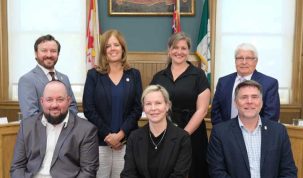By Cecilia Nasmith/Today’s Northumberland
The vitality of Northumberland County’s economic recovery from the COVID-19 shutdown will depend on three overarching issues, county council heard this week.
Tackling broadband deficits, helping businesses acquire efficient on-line platforms and standardizing personal-safety requirements as businesses reopen are the major considerations, Northumberland Economic Recovery Task Force co-chairs Dan Borowec and Brendan Cuneen said in their presentation.
The task force initiative is a public-private sector collaboration, the private sector offering recommendations and the public sector providing background data, information, facilitation and resources.
With Borowec and Cunneen as co-chairs, the task force consists of a half-dozen business owners or leaders, with such sector-specific working groups as micro/small business, manufacturing, tourism, agriculture/food processing, and professional development/construction.
“In turn, many of them, during the course of this exercise, reached out to their personal network for additional input,” Cunneen said.
“It’s important we have you understand this is a much broader group.”
While each working group identified its own set of challenges and put forth its own recommendations, the council presentation focused on the three key ones.
“What came out loud and clear is the issue of high-speed internet connectivity,” Cunneen declared.
It applies to a broad spectrum of people, from the university students told to pursue their studies on-line to the sales, technical and administrative staff of various manufacturing operations.
And with the ability of employees to work effectively from home, he added, there is the potential to attract more GTA-based businesses.
Cunneen noted that an RFP has just closed to evaluate capacity and connectivity levels in Northumberland County and develop a recommended approach.
“We have to be able to say to them, ‘here’s what we already have on the ground, here’s our existing inventory,’” he said. This will enable a consultant to devise a plan that will work smoothly with provincial and Federal supports already in place.
“Unless we address it, some of our existing businesses will be potentially in danger, and we will not be able to attract new business.”
The sudden shutdown made clear to businesses that on-line shopping capacity must be enhanced, and Cunneen cited their survey that drove this point home.
One question whether the respondent planned to reduce the amount of shopping done in local stores got a response of yes 55% of the time.
Another, whether the respondent would support local businesses by shopping on-line, got a 60% yes response.
There are existing provincial programs to facilitate this shift, but users find them very confusing. As a result, a meeting is planned this week – including representatives of chambers of commerce, business-improvement areas and municipalities – to help co-ordinate and simplify the process for potential applicants.
“This is urgent. Based on our survey responses alone, people are going to want to see availability on-line or they may in fact move to somebody else that has an on-line presence.”
Meanwhile, Cunneen said, bricks-and-mortar establishments need a different kind of help.
“We need to address and fuel consumer confidence in allowing people to go back into stores and feel safe,” he said, citing inconsistency and confusion over public-safety standards that has been a problem.
You go into one store, he said, and people are wearing masks, hand sanitizer is available at the door, line-ups must be observed. Then you go next door and see none of the above.
“What’s the right thing to do?” he said.
“We have to look seriously at partnerships with municipalities to have a uniform set of standards with wearing masks or whatever council decides is appropriate, depending on all the sources, including the Medical Officer of Health.”
There will be discussions on this matter at higher levels, he acknowledged, such as the provincial Ministry of Health.
“But at least, coming from council, there’s a statement that is aspirational, that says, ‘this seems like a good idea.’”
The task force believes that success on these three fronts will contribute to success for everyone.
“With these three recommendations, what we are attempting to do is help our businesses come out of this pandemic situation they have found themselves in through no fault of their own,” Cunneen said.























